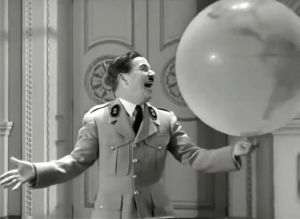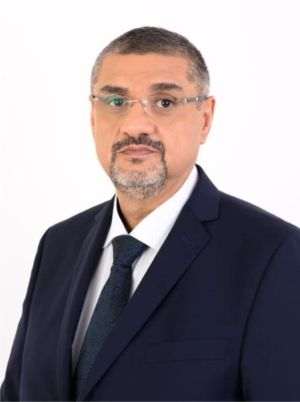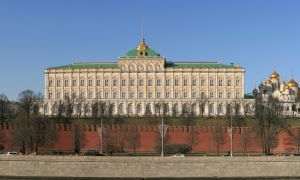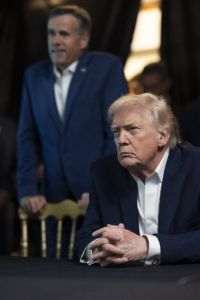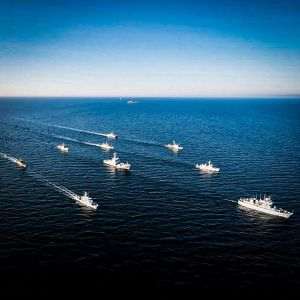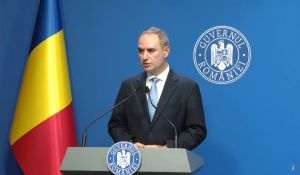Reporter: Not long ago, Mario Draghi, the president of the European Central Bank, was saying that the European Union it has exited the recession and that it is on an upward trend. To what extent can we say that the financial turbulence is a question of the past?
Mihai Tănăsescu: It is clear that Europe has made significant progress in the last five years, since the beginning of the crisis. We know very well that today, the European continent is far better prepared when it comes to a potential crisis than it was at the time. Some lessons have been learned from this financial crisis, which has also turned into an economic crisis in many states. It is also obvious that in 2013 and particularly in 2014, Europe will resume the cycle of economic growth. Obviously the growth rate will be low, but there are some positive signs which make us feel that starting from this moment, Europe will go on an upwards trend.
Reporter: Can you make an approximate prediction, on how much the EU economy could grow?
Mihai Tănăsescu: It is very hard to specify numbers, but what is important is that there is a change in the trend. That change also brings with it a shift in the attitude of the people, the corporations, the banks. These are the first signals which we are seeing after major efforts made by the European countries.
I think that the message of Mario Draghi is a correct one. We need to take it as such, but we also need to look at the future with cautiousness, and to be careful, because we have a lot of challenges ahead of us, especially when it comes to the European banking system.
For example, the European Central Bank decided on Wednesday (ed. note: October 23rd) to conduct an "assets quality review", to determine how much the banking system could withstand, in the event of powerful shocks. 128 banks, which account for over 85% of the European banking assets, have been selected for a stress test, and this is a very important exercise for us, especially since the next step will be the creation of the banking union, which is absolutely necessary in Europe.
All of these efforts, which have been made especially in the area of fiscal consolidation, of structural reforms, together with the efforts which will be done in the coming years, along the line of the consolidation of the banking system, will make Europe far more solid in the coming years, and start to help it win its competitiveness compared to those other continents, especially Asia and America.
Reporter: How do you think that the Romanian banking system will handle this stress-test of the ECB?
Mihai Tănăsescu: The Romanian banks are not included in this exercise, but some of their parent banks are. For instance, Erste Bank, Societe Generale, ING.
Reporter: You were saying that the European-level Banking Union is a necessary step. Do you stand by this idea because we have been constantly having problems or because, regardless of the crisis, this exercise, as you call it, would have been unavoidable anyway?
Mihai Tănăsescu: The banking union is the result of an older European action. It is intended to bring order, discipline and coordination to the European banking system. This also makes the banks to stop being so different in their attitude. Sure, we are talking about a complex exercise. There are voices that say it is a good thing, others that are saying it will be very hard to achieve. Nevertheless, it is still a goal, which Europe must see through in the coming years.
Reporter: Don't you think that a banking union, which would govern the entire banking system of the European Union, could extend, to the other member states, a solution like the one that was adopted in Cyprus this year? Many people feel that that moment marked a dark age in the world of banks, and the people's faith in the system was significantly affected.
Mihai Tănăsescu: The decision which was made for the Cypriot banking system was one that had an outcome which was specific to Cyprus alone. We don't know what rules will be approved for this banking union, if the "bail-in" will be included as a general rule. It is a process which is currently at an incipient stage and we should not forget that aspect. Nevertheless, I think that it is important that this union will lead towards a greater discipline of the banking system in general, and towards a stronger coordination of the European banks.
Reporter: Is the Romanian banking system better capitalized than the one in Cyprus? I ask because there was probably no talk of bail-in over there either, before that concrete situation appeared.
Mihai Tănăsescu: I can tell you, very responsibly, that the Romanian banking system is very solid and very well capitalized. A stress test was made to see what would happen if the Romanian currency depreciated 20% and the findings were that the Romanian banking system would endure and be left with a strong capital ratio at the level of the entire country, even if that happened. It is obvious that the Romanian banking system is solid and we need to have faith in it. Also, we shouldn't miss the fact that the banking system is no different from the way it is everywhere else in the world, it is going through a continuous transformation; some banks leave, others come in. It is precisely this transformation that makes the system solid. Moreover, it has one of the strictest oversights in Europe, and this element isn't just domestic, but rather, as we call it, a "cross border system" - a regional, international oversight system.
Sure, we have some problems with the non-performing loans, which I think the banks should be bolder in dealing with, and they should take the necessary measures to clean up their portfolios as soon as possible. Of course, this means more provisions, higher liquidity, perhaps more capital, a greater effort from banks. What is certain is that we need an acceleration of the process to liquidate non-performing loans.
Reporter: According to the report of the National Bank of Romania (BNR) on financial stability, recently published, the ratio of non-performing loans had reached almost 23% in August, while in 2012, it had reached 18.2%, and at the time that ratio was considered a record. How far are we from solving this problem? Do you think that the strategy for dealing with non-performing loans should be changed completely?
Mihai Tănăsescu: I don't know if the strategy should be changed. I think however, that it takes more courage from banks in acknowledging these loans and in dealing with them. It is clear that the non-performing loans can't have a negative effect on banks, because provisions have been set up for them, but in order to allow for more liquidity, to "clean themselves up", commercial banks need to hurry and deal with their portfolio of non-performing loans.
Reporter: Two years ago, you were saying that Romania's wish to join the Eurozone must remain standing. Have you changed your opinion since then?
Mihai Tănăsescu: No, definitely not. I still believe that Romania must follow this line. It is a commitment which has been assumed, from the very moment we joined the EU. There is no imposed date, and in that regard every country chooses its own strategy for switching to the Euro. Some countries in the former communist bloc have already joined, but we are already speaking about small countries, such as Slovenia, the Baltic countries. What is certain is that there are no major countries such as Poland, Romania, Hungary that have joined. What is important is for the switch to the Euro to be done the moment the country is ready for it. That mechanism is irreversible, you can't say you're joining the Euro at a given time, and then change your mind one year down the road. This involves a consolidation of the policies of the countries in question, so that the process becomes irreversible. Of course, in order to get into the Eurozone you need to meet certain convergence criteria. In order to reach those, it is important for the process of economic restructuring, of fiscal consolidation, of structural reforms to continue, and even to pick up speed. Romania needs to choose a realistic date for joining the Euro. It is not a desire of a politician, but rather a consensus of the entire political class, to reach this national objective, which require shared efforts. The population needs to be prepared for that. This requires a correct communication of this process, to teach people what the Euro currency means, what its benefits and drawbacks are, what advantages and constraints it will have. The preparation of the communication when it comes to such an exercise is crucial for the coming years. I do believe that Romania has quite a number of years ahead to deal with this kind of challenges, so that it is capable of switching to the European currency.
Reporter: When you say "quite a number of years" are we speaking about an interval of five-ten, ten-twenty years?
Mihai Tănăsescu: It is very hard to mention a deadline. It isn't even important, for that matter. What is important is that, the moment the country picks its deadline for switching to the Euro, it should be ready from an institutional point of view, as well as in terms of stability and human perception. I can tell you that, almost ten years after the introduction of the RON, people still give me the prices in millions, when I go to the market. It is an exercise that still needs correct communication, so that the population can learn the difference between RON and ROL. The introduction of the Euro is very important, and the communicational component is more than crucial.
Reporter: So what you are saying is that Romanians are currently uninformed when it comes to the risks and benefits of using the Euro.
Mihai Tănăsescu: I am seeing nothing in the press or in the public space for debating this type of message. I am convinced, however, from the talks I had with the people back home, that this will happen. Everybody is aware of the fact that a correct preparation of the introduction of the Euro is very important.
Reporter: Two years ago, you were saying that Romania's economy was "convalescent", which is why you were saying that postponing the adhesion to the Euro was a correct decision. Should I take it that we are still speaking of a state of "convalescence", since we don't know how long we have before we switch to the Euro?
Mihai Tănăsescu: The convalescence isn't only happening in Romania, but all across Europe. Very few people realize the progress that Romania has made in the last five years. Let's not forget that in 2008-2009, we started off with a deficit of 9-10% of the state budget and five years later, we have reached a deficit of less than 3%. It is an extraordinary adjustment process. This thing caused Romania to be viewed with far more confidence, from a macroeconomic point of view. I still think that Romania has great potential, and I am referring here, first of all, to the human potential; this is the most important resource that we have and we should exploit more than we currently are.
Reporter: The foreign investments also have potential here, but nevertheless they are not at the level we would want them to be at.
Mihai Tănăsescu: Foreign investments have seen a downward trend over the last few years and not just because Romania had a budgetary-fiscal situation that needed to be corrected, but also because many companies have undergone through transformations and restructurings themselves. This has made the investment policy of the major companies to become less expansionistic than it was before the crisis. Now, after the stabilization of the European economy, with a greater predictability of the economy in general, in Europe as well as in Romania, I think that the investment appetite for foreign investments will increase. For that however, we need to meet some requirements, to have a friendlier business environment, to have less bureaucracy, so that investors can access the market more easily. Fiscal stability is more than necessary. I am firmly convinced that foreign investments will continue to gradually increase in the coming years.
Reporter: You seem very optimistic. That is why I would like to present to you the analysts' opinions on the new agreement with the International Monetary Fund (FMI). At the time of the signing, most of them said that Romania had signed its "death sentence". You, on the other hand, see the new agreement as auspicious. What is your answer to that type of opinions, which say that two more years of "pretend reforms" would harm the country?
Mihai Tănăsescu: I have always considered that a partnership with the European Commission and the International Monetary Fund is more than necessary. I've said it and I saying it again. There are countries in Europe and in the world that have not had any recession. Poland is the best example, as it has weathered this crisis very well. Very few people know, however, that for five years now, Poland has an agreement with the IMF, about as long as Romania. There are also other countries that have not had significant problems, but which have a partnership with the IMF. It is the case of Mexico and of many countries in Asia. Having a partnership with the IMF isn't a sentence, but a stability anchor, in the event of some economic turbulences on a global level. But, with or without the IMF, Romania should be able to continue with its structural reforms.
Reporter: You did say however, that the EU is back to a trend of economic growth, that we are far from a new wave of the crisis. Why was a new agreement with the IMF necessary, if that is the case?
Mihai Tănăsescu: Its necessity involves two aspects. First of all, the stabilization of the economy, which currently exists, but which also needs to be consolidated. Secondly, an agreement with the European Community and the IMF offers protection from unpredicted shocks which can occur from where you least expect them. No such scenario seems likely at the moment, but it is cautiousness that makes you have such an attitude, which I consider correct at the present time, for the next two years.
Reporter: There was a rumor at a certain time, that a Moody's team visited Romania, to collect data for determining Romania's sovereign rating, and that they said that the country's image was affected by the issues surrounding Roşia Montană and by the involvement of politicians in the privatization of CFR Marfă. Didn't these things contribute to the deterioration of our country's image abroad? And I am referring here to the internal events. We have examples of such events in history, such as the 1989 revolution, or more recently, the issue of gypsies, who have managed to "export" Romania's image far quicker than the potential of the workforce and of the destinations for foreign investments.
Mihai Tănăsescu: Such events lead to a sentiment than can make it difficult to attract foreign investments. Everybody has domestic issues. I think we exacerbate ours. Being a Romanian who works 2,000 km away from home, I haven't felt these events. Sure, by reading the Romanian press, I enter an entirely different landscape. But on a normal level of public information, these elements are not very well known abroad. They are not as visible as they are reflected in the domestic press. These things, however, have to be looked at carefully. People must be listened to. I see these aspects as communication issues. The role of politics is to learn what can be done and what can't, what is good and what isn't. But, speaking on a global level, Romania needs a well defined strategy for developing its economic potential, in sectors such as energy, agriculture, education, research and development.
Reporter: What other loans does the EIB intend to grant to Romanian banks?
Mihai Tănăsescu: This year, the European Bank for Investment and Development still has several important operations planned, involving both the public and the private segment. We think that between November and December, we will grant a rather significant loan for rural development and we will probably continue talks on new loans to banks.
This year, on the banking segment, we will reach approximately 200-250 million Euros. Next year, we want to propose a cooperation of approximately 300-350 million Euros with the Romanian lenders.
Reporter: Many debt collection agencies were telling us, in the beginning of the year that the number of insolvencies this year could be greater than in 2012, mostly because of SMEs, because it is easier for them to file for insolvencies. How would you explain the directing of such high amounts of money towards their financing?
Mihai Tănăsescu: I think that it is a good sign that banks still lend to SMEs. The group of multinational banks, such as the EIB, has already injected in the Romanian economy, through banks, almost 1 billion Euros. This action will continue. Sure, some companies enter insolvency, others get created, but the fact that banks still believe in SMEs, to me is important, because the Romanian economy relies on that segment of companies.
Reporter: Thank you!


